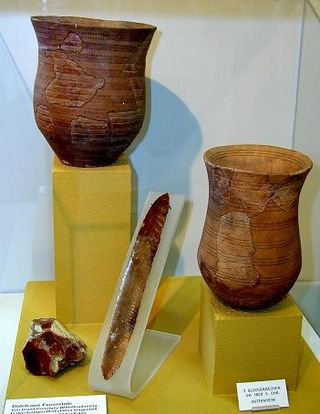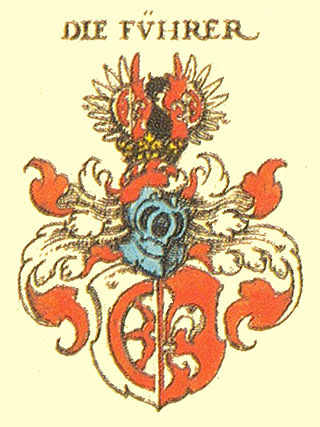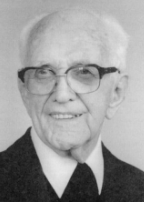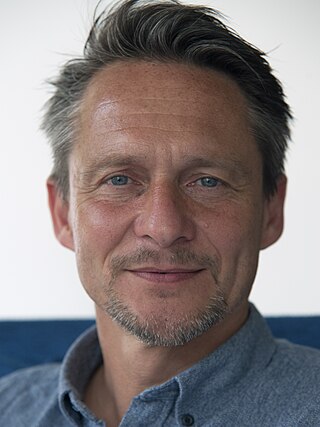Related Research Articles
Ethnology is an academic field and discipline that compares and analyzes the characteristics of different peoples and the relationships between them.

Culture-historical archaeology is an archaeological theory that emphasises defining historical societies into distinct ethnic and cultural groupings according to their material culture.

Leo Viktor Frobenius was a German self-taught ethnologist and archaeologist and a major figure in German ethnography.
In cultural anthropology and cultural geography, cultural diffusion, as conceptualized by Leo Frobenius in his 1897/98 publication Der westafrikanische Kulturkreis, is the spread of cultural items—such as ideas, styles, religions, technologies, languages—between individuals, whether within a single culture or from one culture to another. It is distinct from the diffusion of innovations within a specific culture. Examples of diffusion include the spread of the war chariot and iron smelting in ancient times, and the use of automobiles and Western business suits in the 20th century.

Adolf Philipp Wilhelm Bastian was a 19th-century polymath best remembered for his contributions to the development of ethnography and the development of anthropology as a discipline. Modern psychology owes him a great debt, because of his theory of the Elementargedanke, which led to Carl Jung's development of the theory of archetypes. His ideas had a formative influence on the "father of American anthropology" Franz Boas, and he also influenced the thought of comparative mythologist Joseph Campbell.

The Frobenius Institute is Germany's oldest anthropological research institute. Founded in 1925, it is named after Leo Frobenius. The institution is located at Gruneburgplatz 1 in Frankfurt am Main. An autonomous organization, it is associated with the Johann Wolfgang Goethe University, and works in collaboration with two other organizations, the Institut für Ethnologie, and the Museum der Weltkulturen. It carries out ethnological and historical research. Originally established in Munich and known as the Forschungsinstitut fur Kulturmorphologie, it was renamed by Adolf Ellegard Jensen, its director after the 1938 death of Frobenius.
Robert Fritz Graebner was a German geographer and ethnologist best known for his development of the theory of Kulturkreis, or culture circle. He was the first theoretician of the Vienna School of Ethnology.

Christian Feest is an Austrian ethnologist and ethnohistorian.

Nazi archaeology was a field of pseudoarcheology led and encouraged by various Nazi leaders and Ahnenerbe figures, such as Adolf Hitler and Heinrich Himmler, which directed archaeologists and other scholars to search Germany's archeological past in order to find material evidence supporting an advanced, Aryan ancestry as alleged and espoused by the ultranationalist Nazi Party.

Susanne Schröter is a contemporary Social Anthropologist focussing primarily on Islam, Gender and Conflict Studies.

The Museum of World Cultures is an ethnological museum in Frankfurt, Germany. Until 2001 it was called the Museum of Ethnology.

Christoph von Fürer-Haimendorf or Christopher von Fürer-Haimendorf FRAI was an Austrian ethnologist and professor at the School of Oriental and African Studies at London. He spent forty years studying tribal cultures in Northeast India, in the central region of what is now the state of Telangana and in Nepal. He was married to British ethnologist of India and Nepal, Betty Barnardo.

Adolf Ellegard Jensen was one of the most important German ethnologists of the first half of the 20th century.

The German Inner Africa Research Expeditions were a series of 14 expeditions to Africa carried out between 1904 and 1955 by German scientists. The first 12 of these expeditions were led by the ethnologist Leo Frobenius and they are sometimes referred to as the Frobenius Expeditions.
Helmut Petri was a German anthropologist.
Andre Gingrich is an Austrian ethnologist and anthropologist, member of the Austrian Academy of Sciences, director of the Institute for Social Anthropology of the Austrian Academy of Sciences, and retired professor at the University of Vienna.

Stephen Fuchs was an Austrian Catholic priest, missionary, and anthropologist who researched the ethnology and prehistory of India. After obtaining a Ph.D. in ethnology and Indology from the University of Vienna in 1950, Fuchs moved to India where he assisted in founding the Department of Anthropology at St. Xavier's College in Bombay. After a brief imprisonment for being misidentified as a German missionary by the British government during World War II, Fuchs founded the Indian Branch of the Anthropos Institute, later renamed the Institute of Indian Culture. Fuchs, because of health concerns, moved to Austria in 1996 and died at the age of 91 in Mödling, Austria.
Nils Seethaler is a German cultural anthropologist. He researches historical collections of ethnological objects and human remains.
Georg Pfeffer was a German anthropologist. Born in 1943 in Berlin to a German sociologist father and a British mother, he was schooled in Hamburg. In 1959, he moved to Lahore with his family, and studied at the city's Forman Christian College for 3 years. Later, he moved back to Germany and studied at the University of Freiburg where he also completed his Ph.D.

Roland Josef Hardenberg is a German professor for Social and Cultural Anthropology. From 2009 to 2016 he was director of the Department of Ethnology at the Eberhard Karls University of Tübingen and from 2013 to 2017 deputy spokesperson of the CRC 1070 "ResourceCultures: Socio-cultural dynamics in the use of resources". In October 2016, he moved to a professorship for Social and Cultural Anthropology at the Goethe University Frankfurt am Main and took over as director of the Frobenius Institute in 2017. From 2017 to 2020, he was also managing director of the Institute for Ethnology at the Goethe University. Together with Holger Jebens he publishes the scientific journal Paideuma: Journal of Cultural Anthropology.
References
- ↑ King, Gail; Wright, Meghan; Goldstein, Michael (2017-04-24). "Diffusionism and Acculturation". University of Alabama . Archived from the original on 2022-04-02. Retrieved 2022-04-02.
- ↑ Straube, Helmut (1968). "Frobenius, Leo". International Encyclopedia of the Social Sciences . ISBN 978-0-02-865965-7 – via Encyclopedia.com.